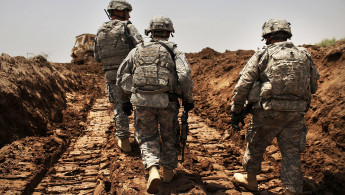Rockets strike Iraq base in third attack on foreign troops in a week
The rockets slammed into the Besmaya base, south of Baghdad, late on Monday night, a statement by the military said.
It made no mention of casualties but Spanish forces linked to the US-led coalition fighting the Islamic State group, as well as NATO training forces, are present in Besmaya.
The past seven days has seen a spike in rocket attacks on Iraqi bases hosting foreign forces, with three coalition troops killed on 11 March in a similar strike on the Taji airbase, which was hit again on 14 March.
In retaliation for Wednesday's rocket fire, the US launched a series of air strikes on militia bases across Iraq's south, killing five Iraqi security forces and a civilian.
Iraqi President Barham Salih stated repeated acts such as Friday's air strikes could turn Iraq into a failed state and revive the Islamic State group. Iraq's military warned of consequences in response to the attacks.
Read more: ‘They’re the virus’: Iraq coronavirus outbreak refuels anti-government protests
Iraq's foreign ministry announced a decision to file a complaint to the United Nations, according to Reuters, in addition to summoning American and British ambassadors.
"The pretext that this attack came as a response to the aggression that targeted the Taji base is a false pretext; one that leads to escalation and does not provide a solution," Iraq's Joint Operations Command said in a statement.
Twitter Post
|
Since late October, there have been 24 rocket attacks on the US embassy in Baghdad or bases where foreign troops are deployed, killing a total of three American military personnel, one British soldier and one Iraqi soldier.
No attacks have been claimed but Washington has blamed Kataeb Hezbollah, a hardline faction in the Hashd Al-Shaabi - also known as the Popular Mobilisation Forces - a military network incorporated into the Iraqi state.
The US has long insisted Baghdad should do more to reign in such factions and prevent them from targeting American troops and diplomats.
But Washington took a much tougher line in December after a US contractor was killed in a rocket attack, launching retaliatory air strikes against Kataeb Hezbollah.
The faction's supporters then surrounded and briefly stormed the US embassy.
Days later, Washington killed top Iranian general Qasem Soleimani and Hashd deputy chief Abu Mahdi Al-Muhandis in a drone strike on Baghdad.
Outraged, Iran launched cruise missiles at the largest Iraqi base hosting US troops and the Iraqi parliament voted to oust all foreign forces from the country, though that has yet to be implemented.
Iran-backed militias in Iraq have repeatedly pledged to avenge the deaths of Soleimani and Iraqi militia leader Abu Mahdi Al-Muhandis.
The escalation sparked fears of war for some, particularly for critics of the Trump administration, leading Congress to look into curtailing the president's powers to declare war on Iran.
The measure was approved by 227-186 in the Democrat-led House of Representatives on Wednesday.





 Follow the Middle East's top stories in English at The New Arab on Google News
Follow the Middle East's top stories in English at The New Arab on Google News
![Netanyahu furiously denounced the ICC [Getty]](/sites/default/files/styles/image_330x185/public/2024-11/GettyImages-2169352575.jpg?h=199d8c1f&itok=-vRiruf5)
![Both Hamas and the Palestinian Authority welcomed the ICC arrest warrants [Getty]](/sites/default/files/styles/image_330x185/public/2024-11/GettyImages-2178351173.jpg?h=199d8c1f&itok=TV858iVg)
